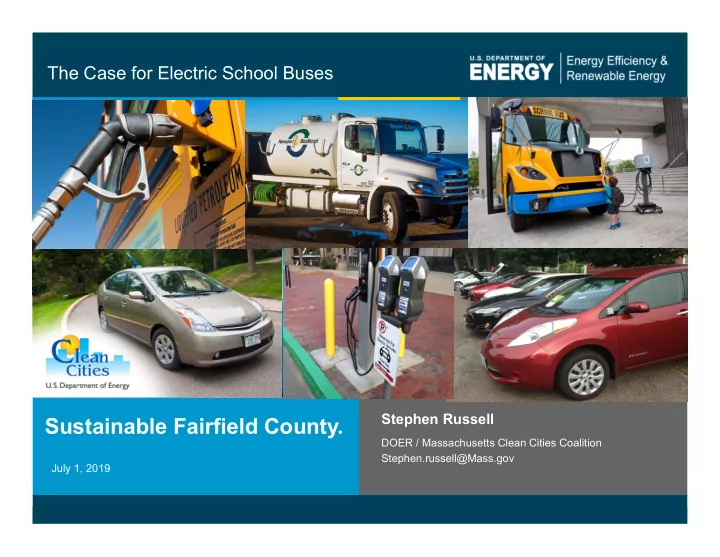

The Case for Electric School Buses Stephen Russell Sustainable Fairfield County. DOER / Massachusetts Clean Cities Coalition Stephen.russell@Mass.gov July 1, 2019 Clean Cities / 1
Department of Energy Resources and DOE Clean Cities Goals • The Massachusetts Department of Energy Resources (DOER) is a state agency whose mandate includes the analysis and development of policies and programs to ensure that Massachusetts' transportation sector is aware of Alternative technologies and fuels available for vehicles today. To that end, DOER strives to create a clean energy future for the Commonwealth, economically and environmentally, including: • Accelerating the deployment of clean alternative fuel vehicles. • Increase the awareness of what technologies are available today • Work with fleets in the electric vehicle sector. • Develop pilot programs to support the integration of electric vehicles into the grid.(V2G) • Reduce petroleum use in the transportation sector To meet the above goals an electric school bus pilot was born Clean Cities / 2
EV School Bus Pilot Goals • Use electric school bus in regular school bus service • Use electric school bus (battery) as energy storage • Demonstrate revenue potential of Vehicle to Grid(V2G) • Or Vehicle to Building (V2B) • Advance the technology with education and awareness • Reduce petroleum use in school bus operations 3 Clean Cities / 3
EV School Bus Pilot Communities involved • Mass DOER and Clean Cities Coalition issued a PON • 3 schools responded: – Amherst – Concord – Cambridge – 2 communities served by Eversource Utility – 1 community served by a Municipal Light Plant (MLP) – Pilot began in 2015 with RFP from towns to procure buses and Elion bus from Canada was the only response to the RFP – Type C bus Clean Cities / 4
EV school Bus video https://youtu.be/mnvEhN47xJ0 Clean Cities / 5
What Have We Learned ? • It is tough to be first…… Some advice….. • Make sure infrastructure is in place before bus arrives • RFP for bus should have service levels… – Where is parts depot, is a service tech available to trouble shoot – Calculate daily route miles so that battery and charging cycle meet the needs of the route – Be aware of demand rates by utility and make sure you have managed charging in either the Bus or charging station – Ask for an experienced EV drive ride along for a period of time when the buses first go into service – V2G was not quite ready for prime time Clean Cities / 6
EV School Bus Pilot Bus manufactured from the ground up 7 Clean Cities / 7
Charging Equipment Level 2 charging DC fast charging Level 1 charging 208/240V 480V 120V Clean Cities / 8
Recommended - Vehicle Charging • 208/240 Volt AC Level 2 charger • Electrical outlet with 30-80 amps • 19.2 kWh current • Charges in four to five hours • Can use two connections to reduce time • Vehicles equipped with managed charging system Clean Cities / 9
Bi-Directional Charging – Coming Soon Vehicle to Grid (V2G) and Vehicle to Building (V2B) • Managed charging • Use battery storage to offset demand charges • Charge battery with energy from renewables (solar or wind) • Participate in energy markets Clean Cities / 10
Contact EV SB Pilot Stephen Russell Clean Cities Coordinator Stephen.Russell@mass.gov 617-626-7325 Final report link below https://www.mass.gov/files/documents/2018/04/30/Mass%20DOER %20EV%20school%20bus%20pilot%20final%20report_.pdf Clean Cities / 11
Recommend
More recommend